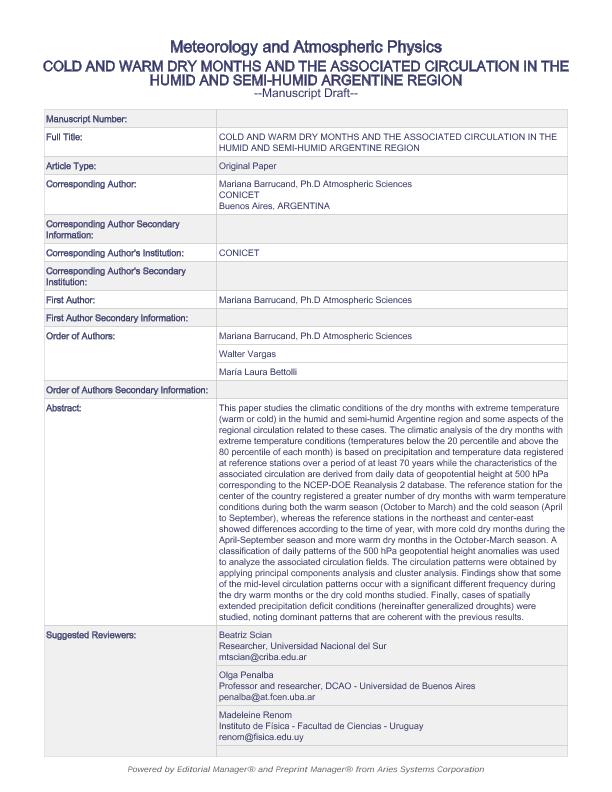Mostrar el registro sencillo del ítem
dc.contributor.author
Barrucand, Mariana Graciela

dc.contributor.author
Vargas, Walter Mario

dc.contributor.author
Bettolli, Maria Laura

dc.date.available
2017-04-24T19:04:48Z
dc.date.issued
2014-02
dc.identifier.citation
Barrucand, Mariana Graciela; Vargas, Walter Mario; Bettolli, Maria Laura; Warm and cold dry months and associated circulation in the humid and semi-humid Argentine region; Springer Wien; Meteorology and Atmospheric Physics; 123; 3; 2-2014; 143-154
dc.identifier.issn
0177-7971
dc.identifier.uri
http://hdl.handle.net/11336/15660
dc.description.abstract
This paper studies the climatic conditions of warm and cold dry months in the humid and semi-humid Argentine region and some aspects of the regional circulation related to these cases. The climatic analysis of warm (temperatures above percentile 80) and cold (temperatures below percentile 20) dry months is based on precipitation and temperature data registered at reference stations over a period of at least 70 years, while the associated circulation is derived from daily data of geopotential height at 500 hPa from NCEP-DOE Reanalysis 2 database. The reference station for the center of the country registered a greater number of warm dry months during both the warm season (October–March) and the cold season (April–September), whereas the reference stations in the north-east and center-east showed differences depending on the time of the year, with more cold dry months during the April–September season and more warm dry months in the October–March season. A classification of daily fields of geopotential height anomalies at 500 hPa was used to analyze the atmospheric circulation related to warm and cold dry months. The circulation patterns were obtained by applying principal component analysis and cluster analysis. Findings show that some mid-level circulation patterns occur with a significant different frequency during the warm dry months or the cold dry months studied. Finally, cases of spatially extended precipitation-deficit conditions (hereinafter generalized droughts) were studied, noting dominant patterns that are coherent with the previous results.
dc.format
application/pdf
dc.language.iso
eng
dc.publisher
Springer Wien

dc.rights
info:eu-repo/semantics/openAccess
dc.rights.uri
https://creativecommons.org/licenses/by-nc-sa/2.5/ar/
dc.subject
Sequia
dc.subject.classification
Investigación Climatológica

dc.subject.classification
Ciencias de la Tierra y relacionadas con el Medio Ambiente

dc.subject.classification
CIENCIAS NATURALES Y EXACTAS

dc.title
Warm and cold dry months and associated circulation in the humid and semi-humid Argentine region
dc.type
info:eu-repo/semantics/article
dc.type
info:ar-repo/semantics/artículo
dc.type
info:eu-repo/semantics/publishedVersion
dc.date.updated
2017-04-24T14:50:24Z
dc.identifier.eissn
1436-5065
dc.journal.volume
123
dc.journal.number
3
dc.journal.pagination
143-154
dc.journal.pais
Austria

dc.journal.ciudad
Viena
dc.description.fil
Fil: Barrucand, Mariana Graciela. Universidad de Buenos Aires. Facultad de Ciencias Exactas y Naturales. Departamento de Ciencias de la Atmósfera y los Océanos; Argentina. Consejo Nacional de Investigaciones Científicas y Técnicas; Argentina
dc.description.fil
Fil: Vargas, Walter Mario. Universidad de Buenos Aires. Facultad de Ciencias Exactas y Naturales. Departamento de Ciencias de la Atmósfera y los Océanos; Argentina. Consejo Nacional de Investigaciones Científicas y Técnicas; Argentina
dc.description.fil
Fil: Bettolli, Maria Laura. Universidad de Buenos Aires. Facultad de Ciencias Exactas y Naturales. Departamento de Ciencias de la Atmósfera y los Océanos; Argentina. Consejo Nacional de Investigaciones Científicas y Técnicas; Argentina
dc.journal.title
Meteorology and Atmospheric Physics

dc.relation.alternativeid
info:eu-repo/semantics/altIdentifier/doi/http://dx.doi.org/10.1007/s00703-013-0300-6
dc.relation.alternativeid
info:eu-repo/semantics/altIdentifier/url/https://link.springer.com/article/10.1007/s00703-013-0300-6
Archivos asociados
